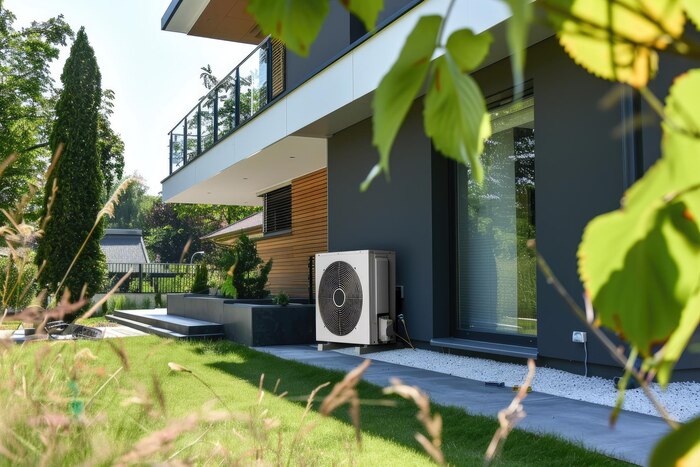24/7 HVAC Emergency Service

By lowering allergens and pollutants, eco-friendly HVAC systems enhance indoor air quality through the use of sustainable technologies. Their cutting-edge filtration lowers utility expenses while preserving comfort and fostering healthier surroundings and energy efficiency. This blog examines how they affect the design of healthy, sustainable living environments.
The quality of indoor air is improved by eco-friendly HVAC systems, which is important for respiratory health. They lessen microbiological contamination, airborne particle pollution, and allergies. By doing this, homes can breathe better air and avoid allergies and asthma.
The ecosystem is also benefiting from these systems. Eco-friendly HVACs preserve indoor air quality while reducing pollution by using less energy and implementing sustainable practices, which benefits both households and the environment as a whole.
High-quality HVAC ducting, using materials like fiberglass or sheet metal, is key in containing pollutants and maintaining healthy indoor air. Regular cleaning and maintenance are crucial to prevent dust, mold, and other harmful particles from circulating through the system.
Well-insulated ducts ensure efficient airflow and minimal energy loss. Proper insulation keeps conditioned air moving effectively, enhancing comfort and preventing stagnant air pockets, thus promoting better indoor air quality.
Heat pumps offer efficient heating and cooling, using renewable sources like geothermal or air-to-air exchange, enhancing sustainable living. They regulate temperature and humidity for superior indoor comfort, with heat exchangers transferring thermal energy for year-round comfort, reducing environmental impact and energy use.
Heat pumps, leveraging renewable energy, significantly aid sustainable living. They lessen dependence on non-renewable heating/cooling methods, reducing residential carbon footprints. These systems align with global environmental conservation goals, offering homeowners improved air quality and lower utility costs while supporting eco-friendly practices.
Heat pumps offer efficient heating and cooling, using renewable sources like geothermal or air-to-air exchange, enhancing sustainable living. They regulate temperature and humidity for superior indoor comfort, with heat exchangers transferring thermal energy for year-round comfort, reducing environmental impact and energy use.
Heat pumps, leveraging renewable energy, significantly aid sustainable living. They lessen dependence on non-renewable heating/cooling methods, reducing residential carbon footprints. These systems align with global environmental conservation goals, offering homeowners improved air quality and lower utility costs while supporting eco-friendly practices.
Eco-friendly HVAC systems, like heat pumps using renewable sources, enhance energy efficiency and lower greenhouse gas emissions. This not only benefits the environment but also improves indoor air quality by reducing the carbon footprint.
These systems feature advanced filters that capture airborne contaminants such as dust, pollen, and mold spores, significantly enhancing indoor air quality and promoting respiratory health.
Smart thermostats and zoning techniques in eco-friendly HVAC systems optimize energy use and maintain healthy indoor environments. Smart thermostats efficiently regulate temperatures, while zoning allows for tailored heating or cooling in different home areas, reducing unnecessary energy consumption.
Eco-friendly HVAC systems employ technologies like UV germicidal irradiation and photocatalytic oxidation, revolutionizing indoor air quality management by eliminating pollutants and microorganisms. Smart sensors and monitoring systems ensure real-time pollutant control, providing healthier living spaces and peace of mind with cleaner air.
Modern HVAC designs prioritize the use of sustainable materials and eco-friendly refrigerants, reducing environmental impact. This approach enhances indoor air quality and promotes environmental sustainability, with HVAC companies leading in integrating energy-efficient components for a greener future.
Eco-friendly HVAC systems with smart technology enable remote monitoring and control of indoor air quality. Homeowners can adjust temperature and humidity levels from anywhere using devices like smartphones. This ensures a healthier living environment, with real-time alerts about air pollutants for proactive indoor air quality management.
These systems use non-toxic refrigerants like hydrofluoroolefin (HFO) for efficient cooling with minimal environmental impact. Additionally, eco-friendly HVAC options include green building materials for ductwork and insulation, reducing exposure to harmful substances found in traditional materials, thereby promoting healthier indoor environments and sustainability.
Optimal indoor air quality and energy efficiency are achieved with correctly sized HVAC systems and regular maintenance. Appropriate sizing ensures efficient performance, while routine upkeep, like filter changes, maintains air quality and prevents excessive energy use.
Energy recovery ventilation systems efficiently exchange fresh air while maintaining indoor temperatures. They recycle energy from outgoing air to precondition incoming air, reducing the need for extra heating or cooling. In summer, they transfer heat from incoming hot air to outgoing cooler air, and in winter, they capture heat from warm indoor air before it exits.
Eco-friendly HVAC systems significantly improve indoor air quality and environmental health. By adopting sustainable, smart, and non-toxic HVAC solutions, homeowners can create healthier homes while optimizing energy use. Understanding and implementing these systems is crucial for enhancing indoor air quality and sustainability. Homeowners can make informed decisions to foster healthier, eco-conscious living spaces, balancing indoor air quality with energy efficiency.
Find ways to fix leaks at home by reading through our blogs at HVAC of America today.
